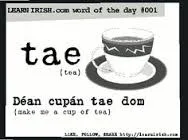Learning an additional language to your own has many benefits; the insights you acquire of other cultures and the nuances of word meanings in that language are a couple. We say in my language things like 'I'd love a nice cup of tea' or to others we might say 'Would you like a nice cup of tea?' What do we mean by 'nice cup of tea?'
 |
My 'nice' may not be your 'nice' but we don't stop to think 'we'll see whether it's nice or not when I get it.' That phrase 'a nice cup of tea' has meanings beyond the literal. It's wrapped up in the tradition of tea drinking, the rituals surrounding the great Irish past time (in my case) of having a nice 'cuppa tae.' Taking tea or having tea' may mean taking a chance to rest a while and ponder or engage with other folk, to have a chat. In my mind the 'niceness' of having a cuppa is not entirely to do with how the tea meets my personal tastes but more to do with the other stuff surrounding it.
'Sit down and have a nice cup of tea' is not so much an invitation to rate the quality and taste of the drink itself but to stop a while and join in some banter about whatever. The tea can be average to exquisite but the niceness of it is considered in the context in which it is consumed; the context of culture. In this sense the meaning we make of the 'a nice cup of tea' is more than literal.
The niceness of a nice cup of tea to me is the stuff going on around the drinking of it. I have memories of coming down to the 'scullery' of a morning and seeing my granda' sitting at the table drinking his tea with a slice of bread and 'buther' reading yesterdays Írish Independent (the Indie). He would say 'sit yourself down child and I'll get ye a cuppa tae.' The tea was always nice (though sometimes stewed) but not because of the tea itself. It's niceness is all wrapped up in memories of times and people past - dear old granda!
 |
| Go on Father Go on go on go on! |
I'm now as old as he was then and Dublin of the 1960's is a million light years form Adelaide in 2015 and I still think to myself 'It's time to have a nice cup of tea.'
I was in the City the other day and my partner and I stopped by a restaurant for a cup of something. I pondered the menu a while and decided to have a cup of tea. The waiter (whose first language was not English) asked me what I would like and I said 'I'd like a nice cup of tea please.' His demeanor changed somewhat as he looked at me quizzically and said 'define nice!' It wasn't a question borne of curiosity but more in the tone of 'are you suggesting that you would get anything but 'nice' at this fine establishment. Are you comparing us at all with other places who may not place as much importance on quality of product and service as we do!'
Something had been lost in translation. The intended meaning of what I said didn't match his received interpretation of it and the waiter had taken umbrage. Whether this was right or wrong, professional or unprofessional is not the point here. It wasn't until after the event that I worked out what may have happened and I can only put it down to that one little word 'nice' and how it is wrapped up in all manner of meanings in my experience, in my culture. 'Would ye not sit down and have a nice cuppa tae child?'
Have a nice day!
 |
| The Vinehouse, Banagher Co Offaly |










